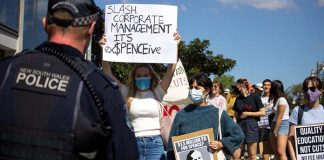The recent Israeli assault on Gaza sparked global outcry. In the US and UK, it has also produced a new wave of student militancy in opposition to imperialism in the Middle East.
University students instigated a lengthy series of occupations and sit-ins throughout February and early March, including 30 in the UK alone. It was the biggest wave of student occupations in 20 years.
Demands on university administrations focused on forcing universities to divest from dealings with Israeli business and arms traders and supply aid and educational assistance to Palestinians. Statements from occupiers condemned Israel’s war crimes, particularly the attack on the Islamic University.
Most occupiers achieved their demands. At Dundee university in Scotland, the university administration agreed to withdraw a contract with BAE systems and send scholarships and educational materials to Gaza. Hampshire College in Massachusetts, USA, has agreed to divest from six corporations that profit from or support the occupation.
The movement has helped buoy the student anti-war movement. Jake, a student at the University of East London, told Socialist Worker (UK) that “everyone is so pleased with our victories. It has made a real difference to the feeling on campus. We’ve set up a Stop the War society and will bring people to the G20 and Stop the War demonstration.” Other organisers in the UK have remarked that many of the students had never considered radical tactics like university occupations before this: now they’re asking when the next one should be.
The University and College Union passed a motion in support of occupations, as did the National Executive Committee of Unison, the UK public sector trade union. The politicisation created by the occupations for Gaza has already extended to other issues seen in the London demonstrations for free education, and the Take Back NYU campaign which demanded free education, among other things.
As the statement of support from Unison read, the students “speak for the millions of young people throughout the world who are sick and tired of war and injustice.”
By Daisy Farnham





